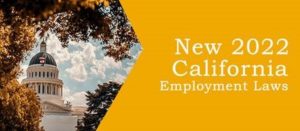New Year, New Employment Laws for 2023!

The following are some legal highlights that will come into play for 2023. Please reach out to us to update handbooks and arbitration agreements for the new year! And, as always, let us know if you have any questions.
Bereavement Leave (AB 1949)
This new law requires covered employers (i.e., those that employ 5 or more employees) to provide eligible employees (those who have been employed for at least 30 days) with up to 5 days of bereavement leave upon the death of covered family members (including the employee’s spouse, child, parent, sibling, grandparent, grandchild, domestic partner, or parent-in-law). This new law requires that the bereavement leave be completed within 3 months of the date of the covered family member’s death. The new law requires employers to maintain employee confidentiality relating to the bereavement leave.
The bereavement leave may be unpaid, however, the new law authorizes an employee to apply any accrued, unused vacation, personal leave, or paid sick leave to their otherwise unpaid leave. An employer may, of course, choose to provide paid bereavement leave for all or part of the 5 days. The employee may be required to provide specified documentation evidencing the family member’s death within 30 days of the first day of their bereavement leave, upon the employer’s request.
Discrimination in Employment: Use of Cannabis (AB 2188)
This new law becomes effective January 1, 2024. It makes it unlawful for an employer to discriminate against a person in hiring, termination, or any term or condition of employment, or otherwise penalizing a person, for either: (1) The person’s off duty cannabis use away from the workplace; or (2) An employer-required drug screening test that has found the person to have non-psychoactive cannabis metabolites in their hair, blood, urine, or other bodily fluids. AB 2188 does not permit employees to possess or use marijuana on the job or otherwise interfere with the rights of an employer to maintain a drug-free and alcohol-free workplace. An employer can still refuse to hire an applicant based on a scientifically valid pre-employment drug screening conducted through methods that do not screen for non-psychoactive cannabis metabolites, including via impairment tests and tests that identify the presence of tetrahydrocannabinol (THC) in an individual’s bodily fluids.
There are some exceptions. For example, employees in the building and construction trades, and does not apply to applicants or employees hired for positions that require a federal background investigation or security clearance. The law also does not preempt state or federal laws that require applicants or employees to be tested for controlled substances as a condition of employment, to receive federal funding or federal licensing-related benefits, or to enter into a federal contract.
CFRA and Paid Sick Leave For Designated Person (AB 1041)
A new law expands the individuals for whom an employee may take California Family Rights Act (“CFRA”) for a serious health condition, to include a designated person. For purposes of the CFRA, “designated person” means any individual related by blood or whose association with the employee is the equivalent of a family relationship. The designated person may be identified by the employee at the time the employee requests the leave. An employer may limit an employee to one designated person per 12-month period for family care and medical leave. Employees may not take Qualifying Exigency leave for designated persons, however.
The law also expands the use of paid sick leave to be used for a designated person. For purposes of sick leave, a designated person means a person identified by the employee at the time the employee requests paid sick leave. An employer may limit an employee to one designated person per 12-month period for paid sick leave.
COVID Exposure Notice Requirements (AB 2693)
This law extends certain COVID-19 workplace safety-related provisions that previously were set to expire on January 1, 2023, through and until January 1, 2024. AB 2693 revises existing Labor Code provisions which required employers to take specified actions within 1 business day of their notice of a potential COVID-19 exposure, including providing written notice to all employees at the worksite that they may have been exposed to COVID-19. Under the new law, an employer can satisfy the notification requirements by prominently displaying a notice in all places where notices to employees concerning workplace rules or regulations are customarily posted, which includes:
- the dates on which an employee or contractor with a confirmed case of COVID-19 was on the worksite premises within the infectious period;
- the location of the exposure (without identifying the infected worker);
- contact information for employees to receive information regarding available COVID-19 benefits to which the employee may be entitled; and
- contact information for employees to receive the employer’s cleaning and disinfection plan.
The law requires this notice to be posted within 1 business day of the employer’s notice of the exposure and it must remain posted for 15 days. It must also be posted on the employer’s existing employee portal (if any), and must be in English and the language understood by a majority of employees. Further, the employer must keep a log of all the dates on which the notice was posted, and allow the Labor Commissioner to access those records.
If the employer prefers, they may still provide written notice to all employees and contractors who were at the same worksite as the COVID-19 case during the infectious period, by means of the employer’s normal method to communicate employment-related information (including personal service, email, or text messages, if reasonable anticipated to be received by the employee within 1 business day). Note, employers must also still provide specified written notice to the exclusive representative (if any) of confirmed COVID-19 cases and of employees who had a close contact, within 1 business day.
AB 2693 repeals Labor Code requirements for an employer, if they are notified of the number of cases that meets the definition of a COVID-19 outbreak, to notify the local public health department within 48 hours, with some exceptions. However, employers should keep in mind that the California Department of Public Health or local departments of public health may impose requirements on employers to report worksite outbreaks, and should monitor and comply with any such requirements.
Employment: Salaries and Wages (SB 1162)
This new law requires private employers with 100 or more employees to submit a pay data report to the California Civil Rights Department (formerly known as the DFEH) on or before the second Wednesday of May 2023, and annually thereafter. Pay data reports required by the law must include the median and mean hourly rate for each combination of race, ethnicity, and sex within each job category. A civil penalty is available for an employer’s failure to file the required report, with penalties deposited in the Civil Rights Enforcement and Litigation Fund.
SB 1162 requires an employer, upon an employee’s request, to provide the pay scale for the employee’s current position. Furthermore, employers with 15 or more employees must include the position’s pay scale in any job posting (including third party job postings) and maintain records of employees’ job titles and wage rate histories for a minimum of three years after termination, to be open to inspection by the Labor Commissioner. There is a rebuttable presumption in favor of an employee’s claim for an employer’s failure to keep records as required by the law. Civil penalties of no less than $100 per employee and no more than $10,000 per violation (with the amount to be determined by the Labor Commissioner), as well as injunctive and other appropriate relief, are available for alleged violations of the law.
Reproductive Health Decision-making (SB 523)
This law revises the California Fair Employment and Housing Act (“FEHA”) to include protection for “reproductive health decision-making” (defined to include, without limitation, a decision to use or access a particular drug, device, product, or medical service for reproductive health), with respect to the opportunity to seek, obtain, and hold employment without discrimination. The new law prohibits discrimination and harassment based on reproductive health decision-making, by employers, labor organizations, and apprenticeships and training programs. In addition, SB 523 makes it unlawful for an employer to require, as a condition of employment, continued employment, or a benefit of employment, the disclosure of information relating to an applicant’s or employee’s reproductive health decision-making.
Supplemental Paid Sick Leave (AB 152)
AB 152 extends California’s existing 2022 COVID-19 supplemental paid sick leave (“SPSL”) entitlements through December 31, 2022, but does not provide additional leave time for employees who previously exhausted available COVID-19 SPSL. The law also provides for a grant program to assist qualified small businesses (those employing between 25 and 49 employees) that incur costs associated with providing mandatory SPSL to eligible employees. Stay tuned regarding whether SPSL will be extended at all into 2023.
Fast Food Facilities and Employment (AB 257)
AB 257, titled the Standards Recovery Act or the FAST Recovery Act, establishes a Fast Food Council (the “Council”) comprised of fast food employees, worker advocates, franchisors, franchisees, and government officials within the Department of Industrial Relations that are responsible for setting industry-wide standards for wages, working hours, and other working conditions related to the health and safety of fast food workers. With respect to minimum wages, specifically, any minimum wage established by the Fast Food Council, from January 1, 2023 to December 31, 2023, shall not be greater than $22 per hour. Conversely, the law “allows” employers to opt out of the Council’s edicts by negotiating less onerous terms in a collective bargaining agreement. The law applies to fast food restaurants with 100 or more establishments nationwide that share a common brand, decor, marketing and packaging, with limited exceptions.
Although the law’s effective date is January 1, 2023, a referendum initiative was filed with the Attorney General of California to challenge AB 257 through statewide elections. Approximately 623,000 signatures must be gathered to place the repeal of AB 257 on the ballot in November 2024. If the initiative qualifies for the 2024 ballot, the Act cannot be implemented until voters decide in that election.
Emergency Conditions and Retaliation (SB 1044)
This law prohibits employers, in the event of an “emergency condition” from taking or threatening adverse action against any employee for refusing to report to, or leaving, a workplace within the affected area because the employee has a reasonable belief that the workplace is unsafe. Emergency condition means conditions posing danger to the safety of people or property at the workplace due to natural forces or a criminal act; or an order to evacuate a workplace, a worker’s home, or the worker’s child’s school due to natural disaster or a criminal act; but not including a health pandemic. There are exceptions to this prohibition. For example, if an employee is a first responder or a health care worker who provides direct patient care then this law does not apply.
 |
 |
| ERICA M. SOROSKY esorosky@ptwww.com (949) 851-7271 |
ERIN K. OYAMA eoyama@ptwww.com (949) 851-7288 |

